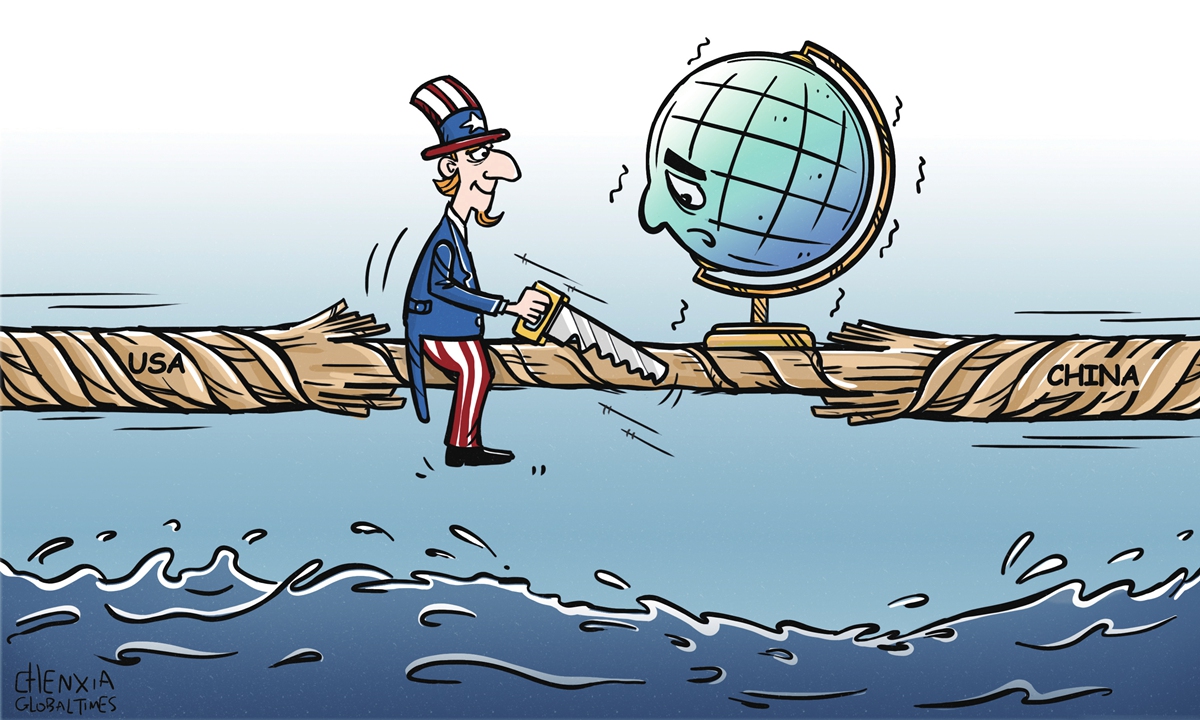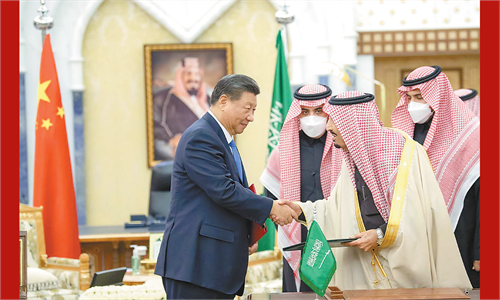
Illustration: Chen Xia/GT
The US and its allies have embarked on a new cold war. Their pundits frame the proxy war on Russia as preparatory to a war on China. China's Taiwan island has been declared as the next Ukraine. As the US wages its hybrid war on China, attacking its economy, technological development, internal security, and investments abroad, countries that are not part of "the West" are being pressured to decouple from Russia and China through extra-territorial sanctions, export controls and energy price caps. Global finance, trade and the dollar reserve system have been weaponized. This reversal of globalization marks the end of the brief unipolar moment of the liberal international order.
If the US and some Western countries are forcing countries to choose, it is because an alternative now exists. The world outside of the US and the West has snubbed these offers to be embroiled in another European war. Instead, it is exploring alternatives. It is rejecting the re-imposition of bipolarity, the drawing of a dividing line between the US and its adversaries. In the worlds of the Foreign Minister of Singapore, Vivian Balakrishnan, "We are not interested in dividing lines in Asia. Don't make us choose. We will refuse to choose." The peoples of the "non-West" in East and West Asia, Africa and Latin America have awakened to their civilizational agency.
There has been a surge of "world-building" activity through BRICS+, the Shanghai Cooperation Organisation and the nested set of East Asian and global institutions around ASEAN. This year we witnessed the Arab world come together in a deepened partnership with China that will overflow into existing links with Southeast Asia, the home of 65 percent of the world's Muslims. East Asian regionalism will meet West Asian and Eurasian regionalism. For each, their most important trading partner is China. The ties between these worlds are ancient. Societies such as Malaysia's embody these connections. Their recovery is a developmental and civilizational aspiration for the 21st century.
China is the largest trading partner for 140 countries in the world. It is also a member of the Global South. With any but the most pious members of the cult of the Western bloc led by the US, if you force decoupling from China, you will instead find yourself decoupled. This is because the contest is not between the US and China, and even less between "democracy and autocracy." It is between the rule of the US and multipolarity, with the latter warmly embraced as the path to the recovery of sovereignty and freedom from neocolonial exploitation. Nowhere is this clearer than in Southeast Asia, and collectively, ASEAN. ASEAN is committed to openness to all. The more, however, that this openness is abused by dictating who we can trade with, who our enemies are, how we must govern ourselves and order our region, the more we discover that ASEAN's commitment to multipolarity is foundational to its existence.
ASEAN was formed in the spirit of the Bandung Conference and the Non-Aligned Movement. It's raison d'etre is to preserve the sovereignty of its member states by resisting recruitment into the exact power bloc politics now being revived by the US.
We do not forget that the last time the US was so interested in our region it meant the slaughter of three million people in Vietnam and a million in Indonesia. The people of Laos have not finished clearing the unexploded bombs from the two million tons rained down on them, more than the total of all bombs dropped during World War II.
Today we need only look to Ukraine to be reminded what it means to be destroyed in a proxy war as an "investment," as one leader proudly put it, against an adversary of the US. We need only marvel at how Europe has abandoned its strategic autonomy for de-industrialized serfdom.
The program of the "rules based order" is more maximalist than the Cold War. Anglosphere policy elites occupy a narrative-based reality. Their narrative of the necessity of liberal democracy and neoliberal capitalism for all places and all times must be maintained whatever the facts. They are the heroes of an eschatological conflict between light and darkness, good and evil, democracy and totalitarianism. Compromise with their satanized adversary is appeasement and coexistence is a dirty word. The West is the last bastion of ideology, the crusader of a deformed, late liberalism with the right to fashion every society on earth in its own image. The rest of us must either be re-made according to the latest iteration of "values," however inimical or repulsive to tradition, culture and faith, or be marked for expulsion. There is nothing in between.
Good luck forcing this infantile logic on the foreign policies of the most culturally and politically diverse region in the world, with a shared identity constituted by two thousand years of cultural cross-pollination across the trade routes of the Old World. Southeast Asia is constituted by its very in-betweenness with respect to the civilizational poles of Islamic, Indic and Sinic worlds. Today it is what makes ASEAN central to the multilateral architecture of East Asia, the crossroads of an "Asian Century" made possible by the rise of China.
For ASEAN to submit to the "the rules based order" chanted by the US would be for all this to disappear. In documents such as the latest US National Security Strategy, Southeast Asia sinks without trace between two oceans, the "Indo-Pacific." The political, economic and cultural reality of a distinctive civilizational region inhabited by 700 million people is gone. China's largest trading partner, a region that contributes more to global growth than Europe, disappears. We get, instead, a strategic construct imposed over our heads for the single purpose of the military encirclement of a nation that threatens Western supremacy by having prospered too much to be dominated, and whose dynamism threatens to help us also build transformational infrastructure and conquer poverty.
The contrast between ASEAN's, China's and the Global South's desire for peaceful development and civilizational rejuvenation, and this Monty Python rerun of 19th century colonialism, could not be greater. It raises laughter. It also threatens to be the run up to a world-ending war.
The author is a former Malaysian government official. This is the third article in the series - "Decoupling from US hegemony." opinion@globaltimes.com.cn

